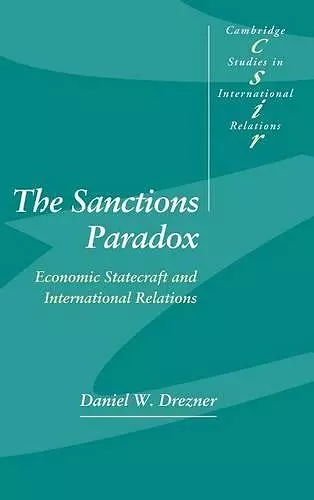The Sanctions Paradox
Economic Statecraft and International Relations
Format:Hardback
Publisher:Cambridge University Press
Published:26th Aug '99
Currently unavailable, and unfortunately no date known when it will be back
This hardback is available in another edition too:
- Paperback£46.00(9780521644150)

This insightful examination of sanctions reveals that countries often impose them under conditions that yield minimal results, as explored in The Sanctions Paradox.
In The Sanctions Paradox, the author explores the intriguing dynamics of economic sanctions in international relations. Conventional wisdom suggests that these measures are ineffective; yet, nations frequently resort to them. This book examines the paradox of why countries are inclined to impose sanctions even when the potential outcomes appear weak. It delves into the motivations behind the initiation of sanctions and the factors that influence their success, providing a comprehensive analysis of a topic that has garnered increasing attention in global politics.
The author, through rigorous game theory and statistical analysis, argues that both the imposers and the targets of economic sanctions factor in their expectations of future conflicts alongside the immediate costs of coercion. This perspective reveals a complex interplay where adversaries may impose sanctions often but struggle to obtain concessions, while allies may hesitate to apply coercive measures yet achieve significant gains once they do. The results challenge traditional views and highlight the nuances of international diplomacy.
Using detailed case studies, including Russia's interactions with newly-independent states and the United States’ efforts to curb nuclear proliferation in North Korea, The Sanctions Paradox provides a rich narrative that combines theoretical insights with practical implications. Ultimately, it suggests that the most favorable outcomes may occur when the imposer is least concerned about their reputation or the distribution of gains, adding another layer to the understanding of sanctions in global affairs.
'The Sanctions Paradox is one of the best books written in the field of international political economy during the 1990s. It offers a simple but clever theory that explains when states are likely to employ economic sanctions and when they are likely to work. Since sanctions seem destined to remain a favourite tool of statecraft in the 21st century, this book is likely to be paid serious attention for years to come.' John Mearsheimer, University of Chicago
ISBN: 9780521643320
Dimensions: 229mm x 152mm x 21mm
Weight: 660g
364 pages